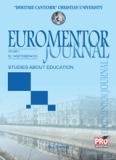TROUBLES AND CHALLENGES OF SPANIARDS BUSINESS SCHOOLS TO ADAPT THE ACADEMIC CURRICUM FOR THE WELLBEING ECONOMICS
TROUBLES AND CHALLENGES OF SPANIARDS BUSINESS SCHOOLS TO ADAPT THE ACADEMIC CURRICUM FOR THE WELLBEING ECONOMICS
Author(s): Antonio Sánchez-Bayón, Estrella Trincado AznarSubject(s): Business Economy / Management, Economic history, Higher Education , State/Government and Education, Economic development
Published by: Editura Pro Universitaria
Keywords: Business School (B-School); compliance; triple-crown; talent; happiness management; wellbeing economics;
Summary/Abstract: The adaptation to the digital economy and the education required for, according to the current compliance regulation for higher education centers in Spain, it‘s a complex, expensive and slow process to renew the academic curricula with solutions for business and markets. In Spain, there are successful Business Schools (B-Schools in the top 25 of the World and accredited with the triple-crown), but at the same time they must to be part of the local official educational system, that is to say, they have to get the approval and periodical verification of the programs to a public agency. For this reason, the Spanish B-Schools Paradox has appeared. The more international accreditations are obtained, the more difficult to make curricula changes, especially due to the resistance of the Spanish agency of verification. This paper explains the historical differences in Spain between professional B-Schools and the academic School of Business at Universities, and how the effect of the mentioned paradox hybrids both. Also, this is part of the current risk for B-Schools because they cannot offer real programs to transit to the digital economy and its key-topics (beyond the soft-skills), like entrepreneurship, talent and happiness economics (ETHE set).
Journal: Euromentor Journal - Studies about education
- Issue Year: XI/2020
- Issue No: 3
- Page Range: 16-36
- Page Count: 21
- Language: English

